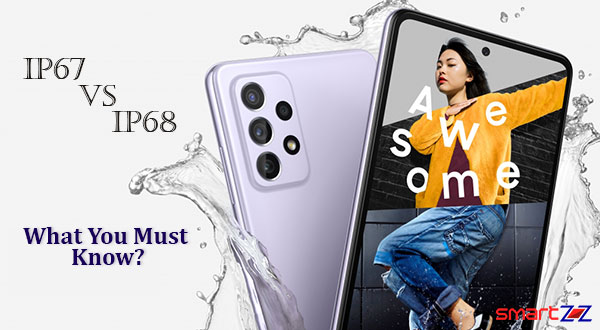IP67 vs IP68, what is the difference? Find out how protected your device is.

All smartphones today are waterproof or water resistant and this is a special feature advertised by many brands. You must be familiar with the terms “IP67” and “IP68”, but do you really know what they are? Follow this post till the end and know all the details and differences between IP67 and IP68. Also find out which is best for you so that you can purchase gadgets with better knowledge.
Before you know the difference between the two most common IP ratings, IP67 and IP68, you must know how an IP system works. The IP rating system is explained with the basic facts below.
IP ratings explained
All gadgets need a level of protection to encounter the challenges in the environments they are used. For, example, if you use your phone in a dusty place or spill and spray water on it, the phone needs some sort of protection to avoid damage. This is where Ingress Protection or IP comes in.
Ingress Protection or IP rating is a system that refers to the level of protection offered to an electronic device. All IP ratings use a two-digit number (e.g., IP67, IP68) to indicate the level of protection offered.
The first digit denotes the Ingress protection against solid objects like dust, fingers, and small tools. This is usually “6” and it means the device has got a dust-tight enclosure. Whereas the second digit denotes the Ingress protection against water. The second digit ranges from 0 to 8 and the lower the number lesser its water tolerance would be. Note that this rating considers only water and not other liquids like oil and more.
Now you must be clear about the Ingress protection or IP rating system. With that finished, let’s get into the business of comparing IP67 and IP 68. These two IP ratings come with a very small but significant difference. So this automatically means that both IP67 and IP 68 are similar in many ways.
Common qualities of IP67 and IP68
Below are the levels of protection that both IP67 and IP68 pass.
- Full protection against dust and other dirt particles.
- Protection against small objects and accidental contacts.
- Splashing and spraying water cause no harm.
- Both can withstand pressurized water jets.
- Water submersion up to 1 meter of water for up to 30 minutes is tolerable.
These are the major protections that you will get with both IP67 and IP68 enclosures. However there is an important difference which we have mentioned below.
IP67 vs IP68. The difference
The major difference between IP67 and IP68 is the additional depth and time that IP68 can resist over IP67.
An IP67 enclosure is water resistant up to the depth of 1 meter and for 30 minutes. But an IP68 enclosure can handle additional depth inside water and resist for prolonged periods.
Note: Know that there will be a mention by the manufacturer about the IP68 enclosure and this determines the depth and length of time the device can resist. For example, if your smartphone is rated as IP68, the manufacturer would have mentioned whether it can handle 2 or 3 meters under water and the time it can resist water. Always check this before you buy a smartphone or any device.
How safe is your phone?
The explanation above clearly says the IP68 is the better IP rating as it can handle more length and longer periods of time in water. But, it is also important to know that all the smartphones that claim to be waterproof are tested with freshwater. The water that splashes or spills on our phones can be from swimming pools and other places so the chemicals in them can still damage the phone. What we advise is, accidents are natural and fine but don’t voluntarily get into a situation where you put your phone underwater.




More Stories
10 Best Smartphone Under 400 dollars (USD) to Buy 2026 February - March
Best Smartphones Under $1000 to Buy in 2026 February - March : Flagship Phones
Best Smartphones Under $300 to Buy in 2026 February - March | Top Unlocked Phones